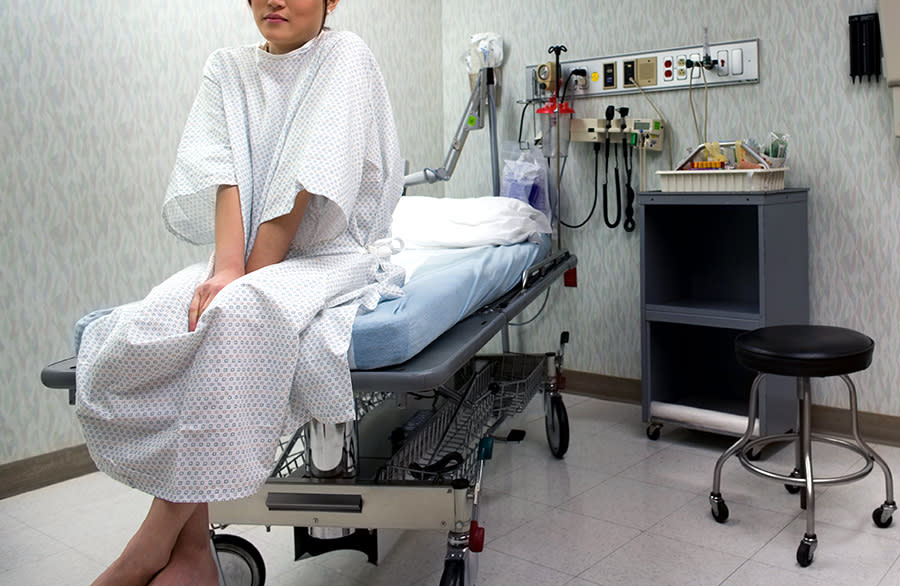A USC gynecologist reportedly took photos of his patients — here's what is and isn't legal

The president of the University of Southern California stepped down on Tuesday following a sex abuse scandal that involved a campus gynecologist. According to critics, school officials looked the other way and even covered up allegations for decades as complaints against the gynecologist mounted.
C.L. Max Nikias agreed to step down from his role, “effective immediately,” according to a letter to faculty, students, and alumni from Board of Trustees Chair Rick J. Caruso that was obtained by the Associated Press. However, he will become president emeritus and a life trustee of the school.
At the heart of the scandal are allegations that former campus gynecologist George Tyndall, MD, routinely made crude comments, took inappropriate photographs, and forced patients to strip naked and groped them — all under the pretense of medical treatment.
One woman, who later went on to become a women’s health nurse practitioner, wrote in a May 23, 2018, essay for the Los Angeles Times that Tyndall had her change behind a thin curtain while he was still in the room, roughly touched her G-spot several times, and said, “I thought you said you weren’t a virgin … your hymen is still intact.” She later realized he wasn’t touching her anywhere near where her hymen would have been. “What I know is that he touched me inappropriately and gave me inaccurate information about my body,” she wrote.
Tyndall, who has retired, is now the subject of two dozen lawsuits and a police investigation into allegations that involve at least 50 women. Caruso said in his letter that a law firm was hired in May to investigate the allegations and had interviewed more than 100 witnesses and collected 4.5 million documents.
Naturally, a case like this can make women nervous about whether the experience they’re having at the gynecologist is appropriate. So what is appropriate during an ob-gyn visit?
What happens during a visit to your gynecologist ultimately depends on why you’re there, but there are a few things you can expect when your visit involves a pelvic exam, says Christine Carlan Greves, MD, a board-certified ob-gyn at the Winnie Palmer Hospital for Women & Babies in Orlando. For starters, you’ll be asked to take off your underwear and put on a gown, and you should be alone in the room when you change.
Then, you’ll generally be asked to sit on the exam table and put a drape that the doctor’s office provides over your pelvic area for privacy. During a pelvic exam, your doctor will examine your vulva and will often insert a speculum to get a closer look at your vagina. The doctor will also often feel your internal organs with a gloved hand, says women’s health expert Jennifer Wider, MD.
If this is an annual exam, your doctor will also likely perform a breast exam to feel for any unusual bumps or lumps, Greves says. When the exam is over, your doctor will leave the room so you can change back into your clothes.
At no point should you be expected to be completely naked. “That is completely inappropriate,” Wider says. You should be appropriately covered during your breast exam, external genital exam, and pelvic exam so that your doctor is only exposing the part of your body that is being examined, she says.
Also, it’s highly unlikely that your doctor will take photos. This typically happens only if there’s something your doctor wants to keep an eye on, such as a vulvar lesion, or if your medical situation is so unique that your doctor is interested in doing a case report on it. But in both of those circumstances, your doctor should ask your permission first and make sure that you’re comfortable with it, Greves says.
Many doctors will also have a chaperone, such as a nurse, in the room with them during pelvic exams, for both their comfort and the patient’s comfort, Greves says, especially if the doctor is male. In some states it’s even required by law. For example, in Georgia, it is considered “unprofessional conduct” for a doctor to examine a member of the opposite sex without a chaperone present. By the way, if you want a chaperone and your doctor doesn’t offer one, you have the right to request and receive one, according to the American Medical Association’s Code of Medical Ethics.
If you’re ever concerned about any part of your exam, it’s important to speak up. “If you’re uncomfortable and it doesn’t feel right in your gut, tell your doctor you feel concerned and the reason for it, or just don’t do it,” Greves says. You also have the right to stop the exam immediately, Wider says. “Patients should feel very comfortable with their health care provider,” she says. “If they don’t, they should not think twice about switching.”
Read more from Yahoo Lifestyle:
Weinstein Will Be Allowed to Use Alleged Victim’s Emails in Rape Case
What is ‘outercourse,’ the term Brock Turner’s lawyer used in sexual assault conviction appeal?
Kobe Bryant wins Oscar in time of #MeToo despite past assault allegation
Follow us on Instagram, Facebook, and Twitter for nonstop inspiration delivered fresh to your feed, every day.
